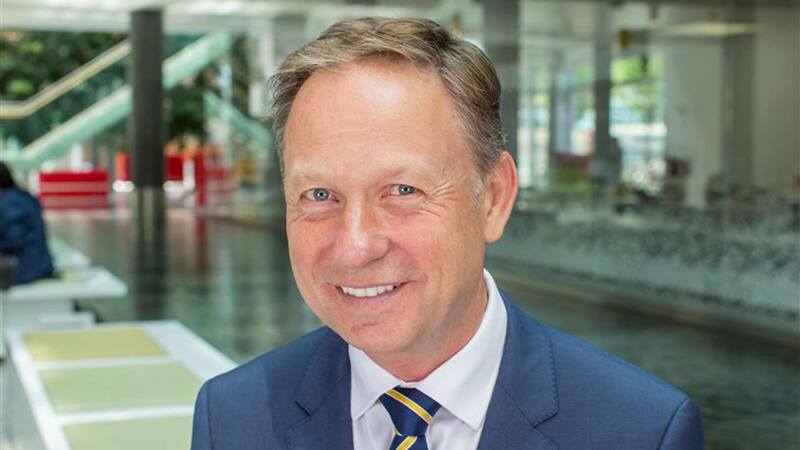You are viewing your 1 free article this month. Login to read more articles.
Pearson forced to defend its strategy at rowdy a.g.m
Pearson has been forced to defend its business strategy at its a.g.m today (29th April), with shareholders voicing their anger over the decline in the company's share price. However, c.e.o John Fallon has vowed "we will get Pearson growing again".
The Pearson board was confronted by disgruntled shareholders over its “controversial” disposals of the FT and the Economist and their “misgivings” about the merger of Penguin and Random House. It was also repeatedly taken to task over perceived "brand damage" from its schools operations in the developing world and participation in the US testing market.
Fallon and new chairman Sidney Taurel were told by one shareholder the business was in a “strategic fog”, with its achievements “well below potential” and its metrics making for “dismal reading". Shareholders who attended the meetings demanded the board continued to answer their questions long after Taurel's attempts to close the session after an hour and a half for lunch.
During the meeting Fallon admitted “cyclical and policy related factors” had cumulatively cost Pearson £230m in profits a year and began the meeting by acknowledging "the pain” that "all of us shareholders have suffered” as a result of the fall in the share price. He said: “I want to acknowledge the pain that all of us as shareholders have suffered as the result in the fall of Pearson’s share price since we last met. The plain fact is that last year we did not deliver on the guidance we gave to investors at the start of the year. We actually held or gained share in most of our largest markets, we continued our digital transition, we made good progress in helping our customers improve the quality of education, but we misjudged the cyclical and policy related pressures weighing on the business.” Pearson's share price fell 40% between April and December 2015.
Responding to criticism, he added: "The growth opportunity for Pearson in education is substantial but we can’t be completely immune to short term cycles. Four years of decline in college enrolments because of the growth of employment and strength of the economy is a short term effect, government changes to BTEC regulations here in the UK have had a short term effect. They hit our profits by £230m per year. That’s a lot for the rest of the business to make up. But the good news is we will make it up and we will get Pearson growing again. We’ve got a very rigorous plan based on a very thorough review of every aspect of the business that will capitalise on those great opportunities you see. We’re very confident we will be back in £800m profit by 2018. And then we’ll build and grow from there."
Proponents of the resolution seeking a “thorough business strategy review”, brought by a coalition of shareholders in support of the American Federation of Teachers were left disappointed, with the motion only gaining 2.36% traction (14,016,634 share votes for vs 578,510,587 against) among shareholders by the session’s close. It had argued Pearson was overreliant on the high-stakes US testing market - something general secretary of Unison Dave Prentis had condemned as “gambling” with stakeholders’ pensions.
Randi Weingarten, president of the American Federation of Teachers, asked the Pearson board during the a.g.m to reconsider its position in suggesting shareholders vote ‘no’ to the resolution on grounds “the education landscape has completely changed in the US”, which Weingarten argued was “one of the reasons why you have a decrease in the share price and decrease in the value since the last a.g.m".
“Teaching the whole child and attending to her well-being is now much more the focus in the United States and much more the focus in terms of the road to school-success and children's success.
She added: "And what has happened to Pearson is, because it is associated with that policy, the brand damage has hugely hurt business and profits and hugely hurt the brand with parents and teachers throughout the US.”
The board agreed “with the philosophy”, that “education should be about the growth of the child”, but that it was “decided by politicians and city councils”. Taurel said: “The role of Pearson is merely to implement those policies," adding assessments only formed 10% of its total business.
Fallon echoed the point, saying it was "important to have a holistic view" but that these kinds of decisions were "quite rightly made by politicians at state level". Moreover he said they [Pearson and AFT] were in "violent agreement".
"If we can find some way as to get beyond the rhetoric, I think it would help all of us," he said.
The board was reminded that the sale of the FT was a move its former c.e.o. Marjorie Scardino said would be "over-my-dead-body” by one shareholder. Fallon said: “It is true to say the business was continuing to perform well but the operating margins of the FT were less than 10% and close to a third of those revenues were dependent on print-based advertising, which we took the view were subject to very significant downward pressure over the next few years and the FT would benefit from being part of a larger focused journalism group. And I think we could agree £1.3bn for a business generating £50m in annual profits is a pretty good deal."
Defending the merger of Penguin and Random House, meanwhile, Fallon responded: “Dealing with your misgivings around Penguin Random House, I hope they’ve been largely dissipated by the performance of the combined business over the past three years. One of the major reasons for combining PRH was in the growth of e-books was a concern that saw greater consolidating power over the players in the market, particularly like Amazon, and the greater scale Penguin acquired through merging with Random House was able to deliver very, very significant cost savings. This means a really strong profit contribution and now our 47% share of PRH is a better profit contribution than if we’d had 100% of Penguin, because of the way that we combined the businesses."
No further comment was offered in relation to market rumours its GlobalEnglish Corp cloud business would be sold, as originally reported by Sky, but teaching of English would continue to be considered as "core".


















